HAITI | UN Says Nearly 1.3 Million Haitians forced to flee gang violence in Haiti
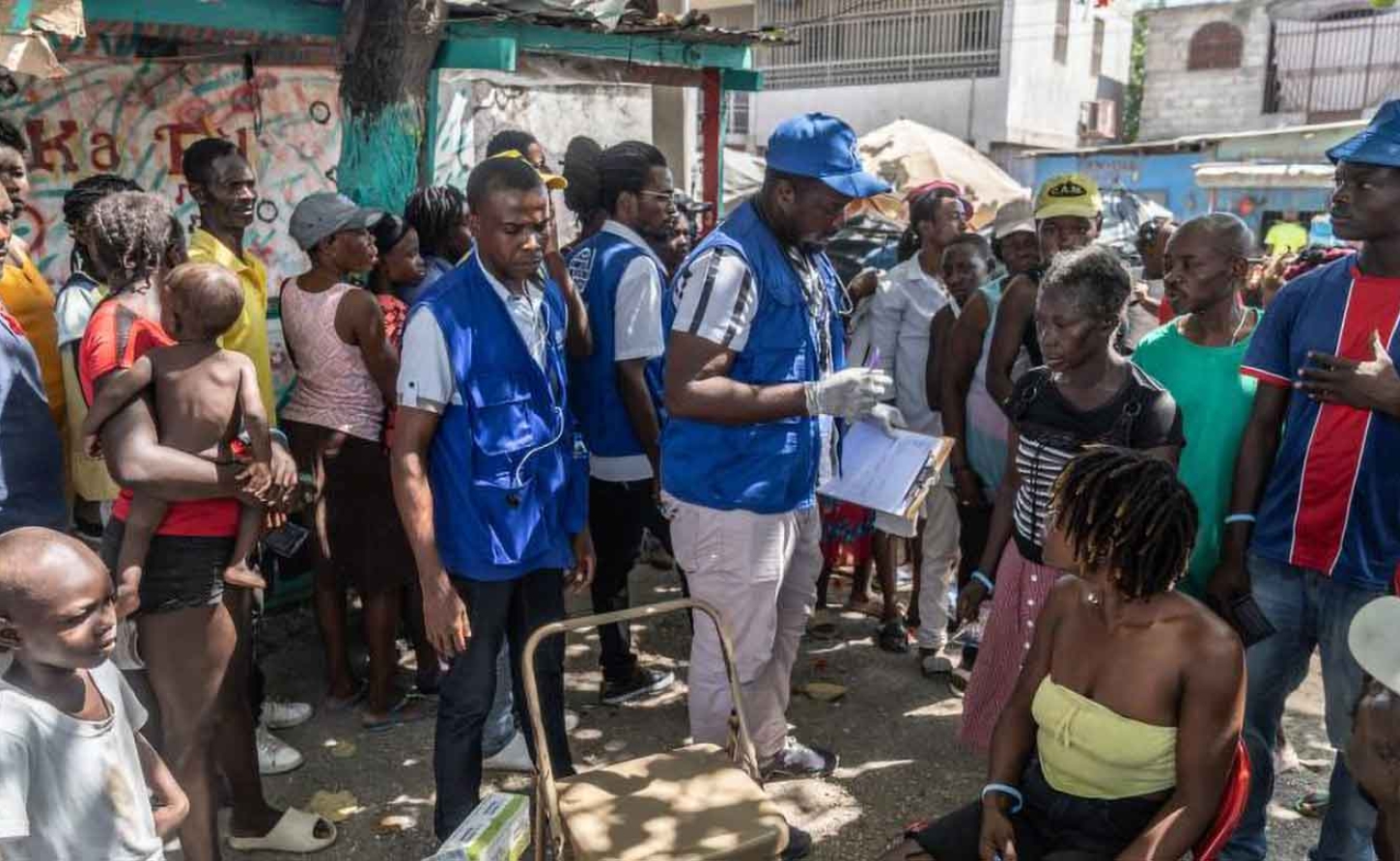
UNITED NATIONS –New York, NY- June 13, 2025 - The United Nations’ International Organization for Migration (IOM) says nearly 1.3 million people have been forced to flee gang violence in Haiti and seek refuge elsewhere within the embattled country and other Caribbean Community (CARICOM) member states.
On Wednesday, the IOM said this represents a 24 per cent increase from December 2024 – the largest number of people displaced by violence on record there.
“Behind these numbers are so many individual people whose suffering is immeasurable; children, mothers, the elderly, many of them forced to flee their homes multiple times, often with nothing, and now living in conditions that are neither safe nor sustainable,” said IOM Director General Amy Pope.
The UN said these figures were released just ahead of a meeting on Wednesday at UN Headquarters in New York, organized by the Economic and Social Council (ECOSOC) and the Peacebuilding Commission (PBC) in examining how peace and stability can return to the Caribbean nation, following years of chaos and crisis.
The meeting discussed ways of consolidating peace at the local level and reducing the violence, particularly through the involvement of women and youth in local initiatives.
At a press conference prior to the meeting, ECOSOC president Bob Rae said the current situation in Haiti was “truly existential.”
“It’s important that we have a meaningful discussion about what we can do together to address these problems,” he said, emphasising that it’s “not just about increasing firepower.”
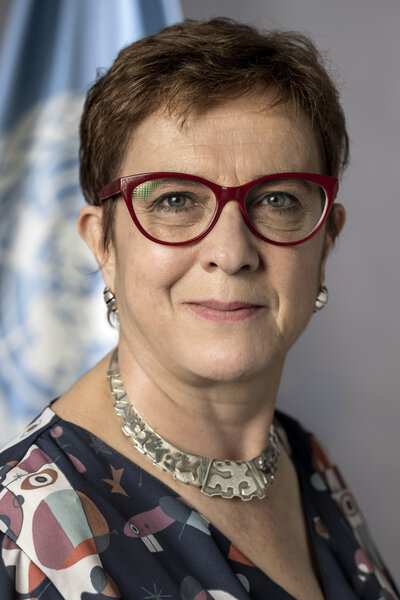
“We believe that the international community’s response must match the scale, urgency, and complexity of the challenge,” she said. “That’s why strong international security support must be accompanied by peacebuilding measures, humanitarian action and political support that could ultimately allow Haiti to make progress on the path to sustainable development.”
Salvador said one way to reduce violence in Haiti is by empowering communities themselves, especially women and children, to lead bold new initiatives.
The UN said Haiti has been experiencing a resurgence of violence since mid-February.
According to the IOM, while the capital, Port-au-Prince, remains the epicenter of the crisis, with 85 per cent controlled by gangs, violence, extending beyond the capital, has intensified in the past few months.
Recent attacks in the Centre and Artibonite departments have forced tens of thousands of other residents to flee, many now living in precarious conditions and temporary shelters.
“Although about a quarter of all internally displaced people still live in the capital, a growing number of people are fleeing to other parts of the country in search of safety,” the IOM said.
In the Artibonite department in western Haiti, it said over 92,000 people have been displaced – largely because of violence in Petite Rivière.
In the Centre department, the situation is even more “alarming”, with a total of 147,000 displaced.
This number has doubled from 68,000 in the past few months as a result of fighting in towns like Mirebalais and Saut-d’Eau.
As more and more people are forced to flee, the UN said the number of spontaneous displacement sites is also increasing.
Since December, these sites have increased from 142 to 246.
Around 83 percent of refugees are staying with host families, putting a strain on already overstretched households, particularly in rural communities.
Armed violence continues to severely disrupt access to basic services, according to the UN aid coordination office, OCHA, creating “a deepening humanitarian crisis.”
“We must act urgently. The strength of the Haitian people is impressive, but resilience cannot be their only refuge. This crisis cannot become the new normal,” Pope said.
The President of the General Assembly, Philémon Yang, spoke at the ECOSOC meeting about the importance of adjusting “not just our attention but our action” and coordinating efforts across the UN to maximise impact.
“We must do our utmost to ensure that Haiti is not abandoned to a future of fear and despair but International Paralysis Fuels Haiti's Descent Into Hell as 1.3 Million Flee Gang Terror
As diplomatic hand-wringing continues, the Caribbean nation slides toward total collapse with violence now spreading far beyond the capital's gang-controlled streets
The numbers tell a story of spectacular international failure: 1.3 million Haitians have been forced to flee their homes, representing a staggering 24 percent surge since December 2024—the largest displacement crisis in the nation's recorded history. Yet as Port-au-Prince burns and entire regions fall under gang control, the world's response has been nothing short of a masterclass in bureaucratic impotence.
At least 5,601 people were killed in Haiti last year as a result of gang violence, an increase of over 1,000 on the total killings for 2023, according to UN figures that lay bare the accelerating carnage. But these statistics, horrific as they are, barely scratch the surface of a humanitarian catastrophe that has rendered Haiti a failed state in all but name.
"Behind these numbers are so many individual people whose suffering is immeasurable," International Organization for Migration Director General Amy Pope said Wednesday, her words echoing with the hollow ring of yet another UN official stating the obvious while the international community fiddles as Haiti burns.
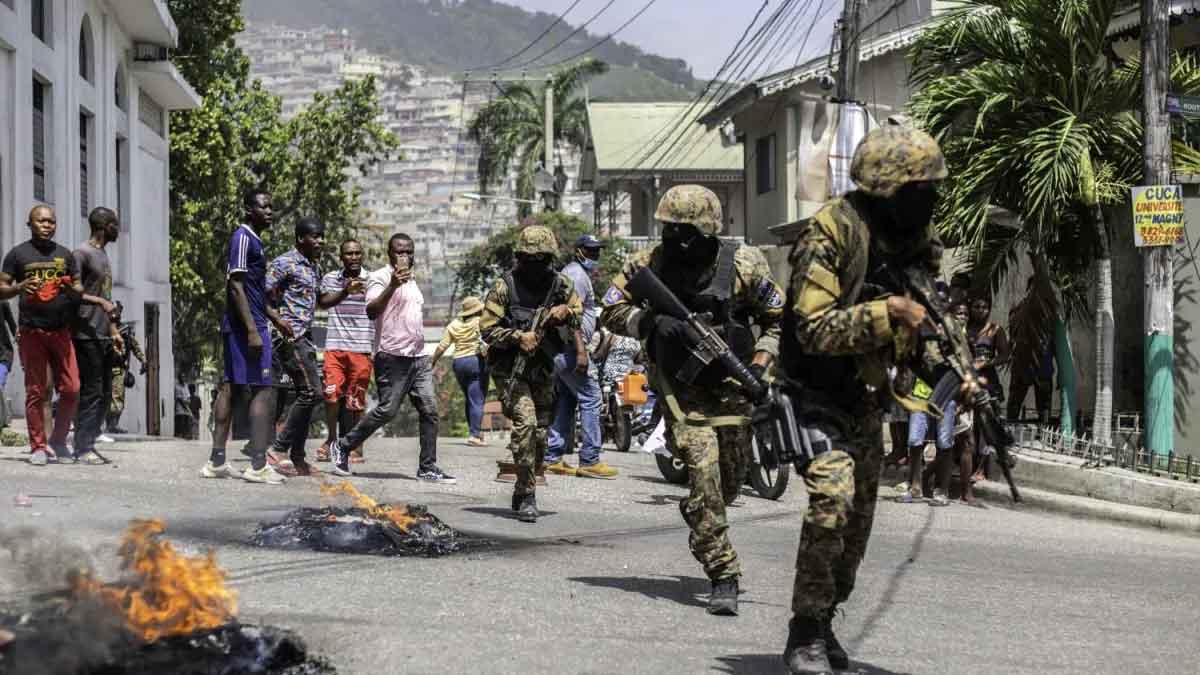 The Kenyan Mirage: A Mission Built on False Promises
The Kenyan Mirage: A Mission Built on False Promises
The much-vaunted Multinational Security Support Mission, supposedly Haiti's salvation, has proven to be little more than an expensive fig leaf for international inaction. More than six months after deploying to help police wrest back control, rampant gangs have gained more territory and power while access to vital humanitarian aid for desperate civilians has dwindled.
The stark reality on the ground mocks the grand promises made in UN Security Council chambers. Just over 380 Kenyan police officers serving alongside 30 soldiers from the Bahamas, Belize and Jamaica constitute the entirety of what was supposed to be a 2,500-strong force capable of taking on gangs, which count some 12,000 members.
Kenya's team in Haiti is awaiting word from State House, the seat of the Kenyan presidency, on how to proceed, as funding crises and equipment failures expose the mission's fundamental inadequacy. 'We didn't get what we expected,' a police source in contact with the contingent in Port-au-Prince said, adding that the equipment – guns and armoured personnel vehicles – is either inadequate or substandard.
The Hidden Puppet Masters: Haiti's Oligarch Enablers
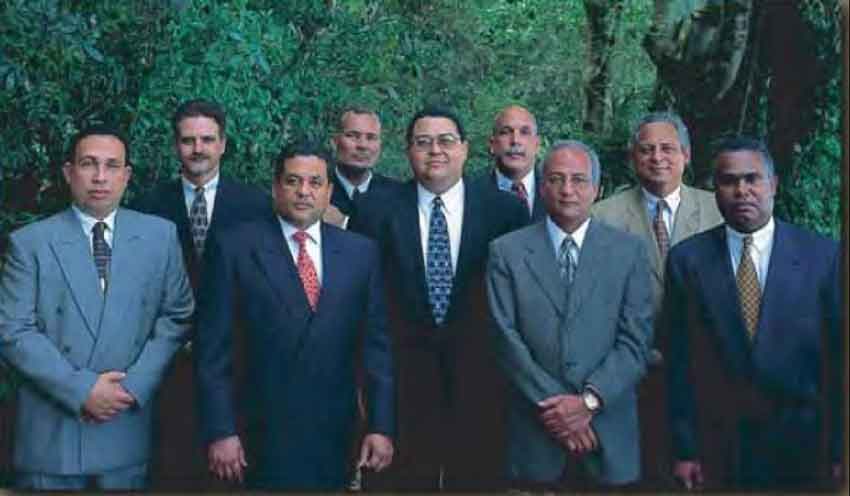
These oligarchs, predominantly of Middle Eastern and European descent, control 90 percent of Haiti's wealth while the vast majority of the Black population lives in poverty. They have turned gang violence into a profitable enterprise, using criminal groups as private militias to protect their interests and maintain political control.
Canada finally broke the code of silence in December 2022, sanctioning Gilbert Bigio—Haiti's only billionaire—along with other elite businessmen for "using their economic power to protect and enable the illegal activities of armed criminal gangs, including through money laundering and other acts of corruption."
Dan Foote, the former U.S. Special Envoy to Haiti, confirmed what many Haitians have long known: "I guarantee there is a positive integer of oligarchs who have used the gangs for security and paid them. They've been running the country for at least 120 years."
The oligarchs operate with impunity through a system designed to evade accountability. Many hold honorary diplomatic positions—Bigio served as Israel's honorary consul for over two decades—allowing them to avoid taxes while maintaining private ports with minimal government oversight. This explains how weapons continue flooding into a country where even police ammunition is strictly controlled.
Gang Empire Expands by Design
While diplomats debate and donors hesitate, gangs control 85 percent of Port-au-Prince, and their reach now extends far beyond the capital's bullet-riddled streets. But this violence isn't random—it's a business model. The oligarchs fund different gangs to maintain territorial control, protect their monopolies, and eliminate political threats.
In the Artibonite department in western Haiti, over 92,000 people have been displaced—largely because of violence in Petite Rivière. The Centre department presents an even more alarming picture, with 147,000 displaced souls, a figure that has doubled from 68,000 in just a few months as fighting consumes towns like Mirebalais and Saut-d'Eau.
In one of the most deadly and shocking incidents in 2024, at least 207 people were killed in early December in a massacre orchestrated by the leader of the powerful Wharf Jérémie gang in the Cité Soleil area of Port-au-Prince. The victims, many elderly people accused of causing a gang leader's son's death through alleged voodoo practices, were systematically butchered, their bodies mutilated and burned to erase evidence.
The Displacement Explosion: A Nation on the Move
As more Haitians are forced to flee, the geography of desperation continues to expand. Since December, spontaneous displacement sites have mushroomed from 142 to 246, creating instant slums where hope goes to die. Around 83 percent of refugees are staying with host families, stretching already broken households to their breaking point, particularly in rural communities that can barely feed themselves.
"Although about a quarter of all internally displaced people still live in the capital, a growing number of people are fleeing to other parts of the country in search of safety," the IOM reported, documenting a nation-wide exodus that shows no signs of slowing.
One million people have been displaced, half of whom are children, creating a lost generation growing up in overcrowded camps without access to education, healthcare, or any semblance of childhood security.
International Complicity in Oligarch Rule
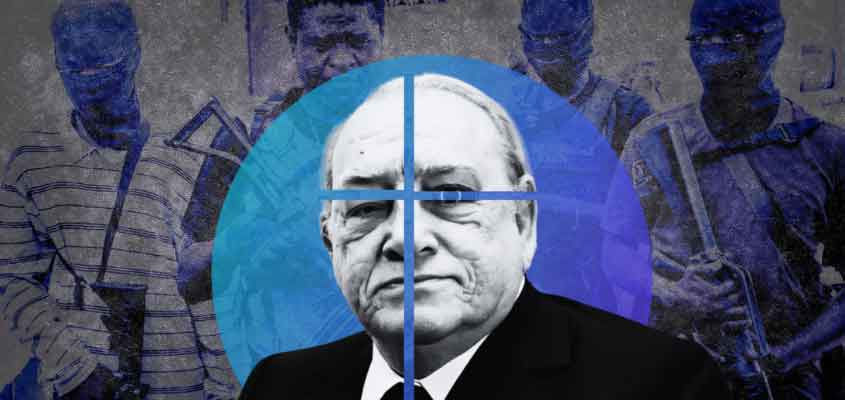
U.S. lawyers and bankers in Miami have helped these oligarchs move money through offshore companies and purchase luxury properties, including Gilbert Bigio's purchase of Jeffrey Epstein's Mercedes Maybach for $132,000—quite a statement in a nation where 4.7 million people face acute food insecurity.
The oligarchs have orchestrated multiple coups, including the 1991 and 2004 overthrows of democratically elected President Jean-Bertrand Aristide. Yet the international community continues treating them as legitimate business partners rather than the architects of state capture they actually are.
Even now, as the Kenyan-led mission struggles with inadequate resources, the oligarchs continue profiting from chaos. They benefit from a weak state that cannot tax them, regulate their monopolies, or investigate their crimes. Why would they want stability when instability serves their interests so perfectly?
Wednesday's UN meeting at headquarters in New York, organized by the Economic and Social Council and the Peacebuilding Commission, offered the usual menu of solemn pronouncements and empty promises. ECOSOC president Bob Rae called the situation "truly existential," emphasizing that solutions require more than "increasing firepower"—a convenient dodge given the international community's inability to provide even adequate firepower.
Special Representative María Isabel Salvador stressed the need for "multifaceted and dynamic solutions," bureaucratic speak for the kind of comprehensive response that remains perpetually beyond reach. "We are approaching a point of no return," she warned. "Without timely and decisive international support, the violence will continue to escalate, and Haiti could face total collapse."
Yet this "timely and decisive" support remains as elusive as ever. The funding shortfall for the UN trust fund, which relies on voluntary contributions from member states rather than the mandatory assessments used for traditional peacekeeping missions, has significantly delayed the deployment of Kenyan police to Haiti.
The Price of Neglect
The United States has shouldered a disproportionate financial burden for the MSS, contributing $380 million, while Canada has provided $59 million. France, Haiti's former colonial master, has contributed a pathetic $8 million—less than the cost of a single luxury yacht—underscoring Europe's shameful abandonment of its historical responsibilities.
The human cost of this international neglect grows more staggering by the day. Armed violence continues to severely disrupt access to basic services, creating what UN coordination office OCHA describes as "a deepening humanitarian crisis." Hospitals have shuttered, schools have closed, and entire neighborhoods have become no-go zones patrolled by teenagers with assault rifles.
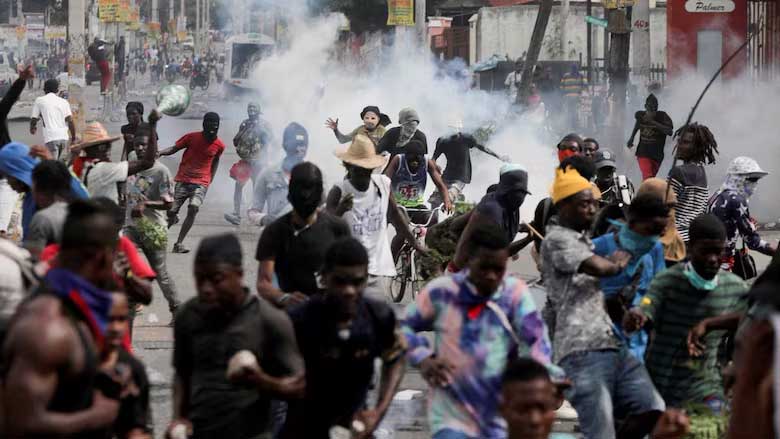 "We must act urgently," Pope said, echoing the refrain that has become Haiti's epitaph. "The strength of the Haitian people is impressive, but resilience cannot be their only refuge. This crisis cannot become the new normal."
"We must act urgently," Pope said, echoing the refrain that has become Haiti's epitaph. "The strength of the Haitian people is impressive, but resilience cannot be their only refuge. This crisis cannot become the new normal."
Yet for the 1.3 million displaced Haitians sleeping in makeshift shelters tonight, this crisis has already become exactly that—a new, horrific normal that the international community seems content to accept with hand-wringing and half-measures.
General Assembly President Philémon Yang spoke about "adjusting not just our attention but our action," but his words ring hollow against the backdrop of a mission starved of resources and a response crippled by bureaucratic inertia.
"We must do our utmost to ensure that Haiti is not abandoned to a future of fear and despair," Yang declared. Based on the evidence of the past year, that abandonment is already well underway, leaving 1.3 million displaced Haitians to wonder whether the international community's commitment to "leaving no one behind" was always just another empty slogan.
The Ultimate Cruelty: America Abandons Its Own Promise
Just as Haiti teeters on the brink of total collapse, the Trump administration has delivered what may be the cruelest blow yet: the termination of Temporary Protected Status for roughly 520,000 Haitians living legally in the United States, effective August 3, 2025. In a stunning display of calculated indifference, Homeland Security Secretary Kristi Noem rescinded the Biden administration's extension that would have protected these families through February 2026.
Noem went on "Fox & Friends" and called the people facing deportation "dirtbags," declaring "The people of this country want these dirtbags out"—referring to individuals who include teachers, healthcare workers, and essential employees who have built lives and contributed to American communities for over a decade.
The timing borders on the sadistic. As one advocacy group noted: "To send 500,000 people back to a country where there is such a high level of death, it is utterly inhumane". The decision essentially forces half a million people to choose between voluntary exile to a war zone or life in the shadows as undocumented immigrants.
The numbers tell their own story of how Haiti's crisis has exploded: in 2011, just 57,000 Haitians were eligible for TPS protection; by 2024, that figure had skyrocketed to 520,694—a nearly tenfold increase that reflects the country's accelerating descent into chaos.
"Nobody is safe in Haiti," said Farah Larrieux, a 46-year-old Haitian who arrived in the U.S. in 2005 and has been protected by TPS since 2010. "This is a disruption of people who have been in this country contributing so much. People have been giving their sweat, their life, the sacrifice to this country".
As the oligarchs consolidate their stranglehold on Haiti while gangs serve as their enforcers, the international community's response reveals itself as not merely inadequate, but actively complicit in a system of exploitation. The question now isn't whether Haiti will collapse entirely—the oligarchs prefer controlled chaos to genuine democracy. The real question is how many more lives will be sacrificed to maintain a system that enriches a few families while forcing 1.3 million people to flee their homes and hundreds of thousands more to face deportation from the only safe haven they've known.
The BAM BAM families have succeeded where colonial powers once failed: they've created a perfect extraction machine that generates wealth for oligarchs while maintaining the fiction of sovereignty. Until the international community stops enabling these puppet masters and starts dismantling their networks of corruption, Haiti's descent into hell will continue—exactly as designed.
instead is embraced by a global commitment to peace, opportunity and dignity,” he said.
-30-
